
- Other Name
- U.S. Embassy Minsk
- Sponsors Type
- Federal/National
- Country
- Belarus
Contact Info
- usembassyminsk@state.gov
- Address
- 46 Starovilenskaya St., Minsk 220002, Belarus
Last modified on 2025-09-13 10:42:23
Description
**U.S.-BELARUS RELATIONS**
The United States supports a sovereign, independent Belarus which respects the rights and voices of the Belarusian people. On December 25, 1991, the United States recognized the independence of the Republic of Belarus, and on December 28, 1991, Belarus and the United States established diplomatic relations. On January 31, 1992, the U.S. Embassy was officially opened in Minsk. The embassy of Belarus was opened in Washington in 1993.
Alyaksandr Lukashenka came to power through a presidential election in Belarus in 1994 that was generally considered to be free and fair, but since that time, he has consolidated authoritarian control of the country through extensive repression and corrupt practices. In 1996, Lukashenka reacted to Western criticism of a referendum that dissolved the parliament and expanded the authority of the presidency by temporarily expelling the U.S. and EU Ambassadors.
After a presidential election in 2006 that was neither free nor fair, the United States imposed travel restrictions and targeted financial sanctions on nine state-owned entities and 16 individuals (including Lukashenka). In 2008, after the United States tightened sanctions due to worsening human rights abuses, Belarus again expelled the U.S. ambassador along with 30 out of 35 U.S. diplomats. In August 2015, after Lukashenka released Belarus’s six remaining political prisoners, the United States provided limited sanctions relief by generally authorizing activities involving certain state-owned entities subject to U.S. sanctions.
In 2019, the United States and Belarus announced they would exchange ambassadors as the next step in normalizing bilateral relations, and Julie Fisher, the first U.S. Ambassador to Belarus since 2008, was confirmed by the Senate on December 15, 2020, but Belarus withdrew agrément for Ambassador Fisher before she was able to present her credentials. Ambassador Fisher was later appointed to be the Special Envoy to Belarus (located in Vilnius, Lithuania), a position she held until her departure in June, 2022.
Following the fraudulent August 9, 2020 presidential election, in which significant election irregularities were reported, Alyaksandr Lukashenka claimed immediate victory over popular opposition candidate Sviatlana Tsikhanouskaya. In response, Belarus erupted in massive nation-wide, peaceful protests — at times attracting up to 200,000 participants — which were met with violent repression through thousands of arrests and reports of torture of detainees. In the aftermath of the protests, the regime clamped down still further on the human rights and civic space in Belarus. Opposition leaders and independent journalists were systematically jailed or forced into exile. Since 2020, the Lukashenka regime continues to hold hundreds of political prisoners – many of whom are jailed for years in appalling conditions and without any contact with family, friends, or lawyers. As a result of continued repression and human rights abuses, the United States has imposed additional sanctions and visa restrictions on various actors implicated in the disputed election and related crackdown on civil society.
In 2021, the Lukashenka regime forced the closure of USAID’s office in Minsk and the United States Embassy’s Public Diplomacy section, dramatically curtailing the United States’ ability to provide assistance to Belarusians. The United States suspended operations at its embassy in Minsk in February 2022, following Belarus’s role in facilitating Russia’s full-scale invasion of Ukraine.
**U.S. Assistance to Belarus**
U.S. assistance to Belarus focuses on promoting democratic principles and respect for human rights and fundamental freedoms, including by supporting independent media and capacity-building for civil society organizations. Since 1992, the U.S. government has provided over $1 billion in foreign assistance to civil society organizations in Belarus. In September 2024, three years after the Lukashenka regime closed USAID’s office in Minsk, USAID opened a new office in Vilnius, Lithuania, to oversee its assistance to the Belarusian people. The United States maintains an unshakeable commitment to the people of Belarus and their democratic future.
**Bilateral Economic Relations**
Belarusian authorities have been reluctant to undertake systemic economic reforms necessary to create a market-based economy. As of 2020, the last year for which data was available, the state sector accounted for half of all employment, and 60-70 percent of GDP. Belarus’ opaque legal and regulatory systems, and rule of law deficiencies create a challenging business environment. Since August 2020, the Belarusian authorities have increased pressure on private business, making it more and more difficult for Belarusians to find private sector employment.
**Belarus’s Membership in International Organizations**
Belarus is a member of international organizations, including the United Nations, Organization for Security and Cooperation in Europe, Eurasian Economic Union, International Monetary Fund, and World Bank. It is also member of the Commonwealth of Independent States, the Shanghai Cooperation Organization, and the Collective Security Treaty Organization. Belarus is an observer to the World Trade Organization and is a BRICS partner country.
Sponsor Relationship
U.S. Embassy in Belarus is a part of:
No sponsor in our database are part of U.S. Embassy in Belarus.
Most Recent Grants from This Sponsors
No grants from this sponsor remain active at the moment.
Deadline Approaching Grants
No grants from this sponsor have deadline within a month period.
